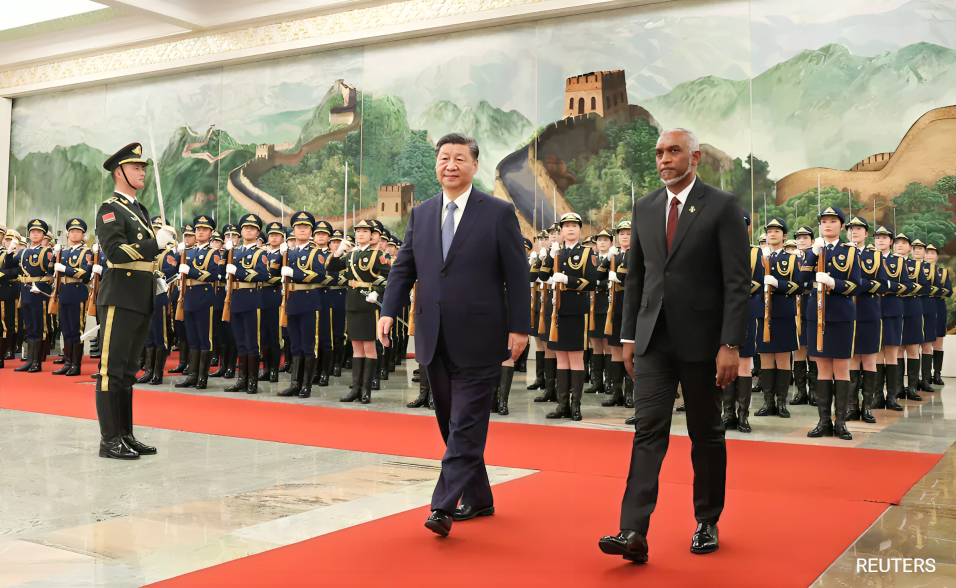Tides of Change: Indian Troop Withdrawal and the Shifting Balance of Power in Maldives

Image Source: NDTV
The statement by Alfred Mahan, “Whoever controls the Indian Ocean will dominate Asia,” is true with the shift of geopolitical tension in the Indian Ocean. The withdrawal of Indian troops from Maldives marks an important shift in the geopolitics of the Indian Ocean and potentially reshapes the power dynamics in the archipelago and beyond. Referring to the historical bilateral relationship, Maldives had long been in India’s sphere of influence, owing to its strategic location and historical ties. However, the withdrawal of the 25 Indian stationed troops creates a void for other regional players, notably China, to expand their footprint in the region.
The stationing of Indian troops in the Maldives holds strategic stability and security, as of India’s interests in the Indian Ocean. The Maldives have long been seen by India as a component of its sphere of influence, serving as a safeguard against any challenges from other regional nations. The troop withdrawal, however, indicates a reassessment of India’s strategy, maybe motivated by a want to lessen military presence in the area or an acknowledgement of the Maldives’ shifting geopolitical objectives.
China had been encircling India through a ‘string of pearls strategy’ by building up a network of military and commercial bases and ports in many countries. China’s engagement in Maldives had been frequent after the Muizzu government. In his recent visit in January, the two governments agreed to draw up an “action plan” for building a China-Maldives Comprehensive Strategic Cooperative Partnership from 2024 to 2028. The signing of the 20 MOUs — including several areas such as the blue economy, digital economy, and infrastructure development projects linked to the Belt and Road Initiative has built Maldives’ reliance on China.
The implications of the Chinese engagement in the region are significant because of its expansionist and debt-trap dynamics. In the case of Sri Lanka, we have seen the Chinese engagement and the usage of the Hambantota port on lease for 99 years. India could be in a tight spot as it tries to protect its interests in the area while negotiating with a more assertive China. Furthermore, the withdrawal of the Indian troops encourages other South Asian countries like Pakistan and Bangladesh to deepen their ties with Maldives, which would further exacerbate the geopolitical dynamics of the South Asian region.
The shifting dynamic of Maldives holds both opportunities and challenges. The Chinese engagement would be leveraging to Maldives but in the sphere of geopolitics, everything comes with interest. The engagement of China might lead the Maldives into debt dynamics and might lose its sovereignty and autonomy. The withdrawal of the troops would heighten the bilateral relations between Maldives and India. Recently, India allocated Rs 600 crore to the Maldives for the Interim Budget for 2025, announced in February 2024, which is 50% more than the Rs 400 crore allocated in the 2024 BE budget.
The Maldivian administration has responded to these events by stressing the significance of upholding an impartial and balanced foreign policy that puts the interests of the country above those of outside forces. Attaining this equilibrium, nevertheless, will need cautious diplomacy and astute judgment, especially as the Maldives manages its ties with China and India.
In the end, the withdrawal of Indian forces from Maldives signifies a major change in the geopolitical context of the area. It highlights how the balance of power in the Indian Ocean is changing with China ready to fill the void created by India’s withdrawal and establish its influence. The future of the Indian Ocean and the dynamics of international relations in the area will be shaped by how the Maldives and other regional countries manage these developments. The stage is set for a new chapter in the geopolitics of the Maldives and beyond as the waves of change continue to wash over the Indian Ocean.
Team Profile

- Tanya Singh Yadav is a master's student currently in her fourth semester, passionately pursuing career opportunities within organisations that advocate for environmental consciousness while providing avenues for personal growth and development.
Latest entries
 English30 March 2024Moscow Launches Large-Scale Attack on Ukraine’s Energy Infrastructure, Escalating Conflict
English30 March 2024Moscow Launches Large-Scale Attack on Ukraine’s Energy Infrastructure, Escalating Conflict Defence30 March 2024Indian Navy Rescues Pakistani Fishermen from Somali Pirates in the Arabian Sea
Defence30 March 2024Indian Navy Rescues Pakistani Fishermen from Somali Pirates in the Arabian Sea English30 March 2024Diplomatic Overhaul: Biden’s Correspondence Sets New Tone with Pakistan
English30 March 2024Diplomatic Overhaul: Biden’s Correspondence Sets New Tone with Pakistan English29 March 2024Assam Government Extends Armed Forces (Special Powers) Act in Four Districts for Six Months
English29 March 2024Assam Government Extends Armed Forces (Special Powers) Act in Four Districts for Six Months









